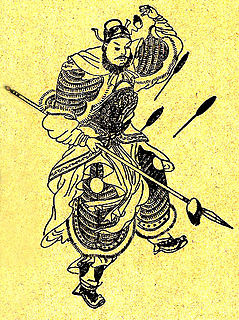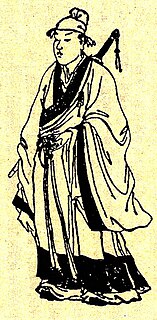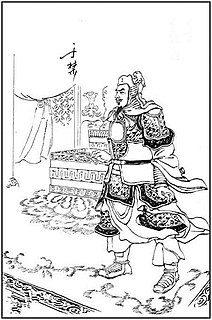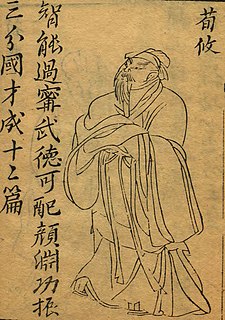Related Research Articles

Liu Bei, courtesy name Xuande (玄德), was a warlord in the late Eastern Han dynasty who founded the state of Shu Han in the Three Kingdoms period and became its first ruler. Though he was a distant relative of the Han imperial family, Liu Bei's father died when he was a child and left his family impoverished. To help his mother, he sold shoes and straw mats. When he reached the age of fifteen, his mother sent him to study under scholar and official, Lu Zhi. In his youth, Liu Bei was known as ambitious and charismatic. He gathered a militia army to fight the Yellow Turbans. Liu Bei fought bravely in many battles and grew famous for his exploits. Rather than join the coalition against Dong Zhuo, he joined his childhood friend Gongsun Zan and fought under him against Yuan Shao many times.

Zhao Yun, courtesy name Zilong (子龍), was a military general who lived during the late Eastern Han dynasty and early Three Kingdoms period of China. Originally a subordinate of the northern warlord Gongsun Zan, Zhao Yun later came to serve another warlord, Liu Bei, and had since accompanied him on most of his military exploits, from the Battle of Changban (208) to the Hanzhong Campaign (217–219). He continued serving in the state of Shu Han – founded by Liu Bei in 221 – in the Three Kingdoms period and participated in the first of the Northern Expeditions until his death in 229. While many facts about Zhao Yun's life remain unclear due to limited information in historical sources, some aspects and activities in his life have been dramatised or exaggerated in folklore and fiction. In the 14th-century historical novel Romance of the Three Kingdoms, he was lauded as a member of the Five Tiger Generals under Liu Bei.

Zhang He, courtesy name Junyi, was a military general serving under the warlord Cao Cao in the late Eastern Han dynasty of China. He continued serving in the state of Cao Wei under its first two rulers, Cao Pi and Cao Rui, during the Three Kingdoms period until his death.

Lü Bu, courtesy name Fengxian, was a military general and warlord who lived during the late Eastern Han dynasty of Imperial China. Originally a subordinate of a minor warlord Ding Yuan, he betrayed and murdered Ding Yuan and defected to Dong Zhuo, the warlord who controlled the Han central government in the early 190s. In 192, he turned against Dong Zhuo and killed him after being instigated by Wang Yun and Shisun Rui, but was later defeated and driven away by Dong Zhuo's followers.

Guo Jia (170–207), courtesy name Fengxiao, was an adviser to the warlord Cao Cao during the late Eastern Han dynasty of China. Throughout his 11 years of service, Guo Jia aided Cao Cao greatly with his brilliance and foresight, and his strategies were instrumental to Cao Cao's triumphs over rival warlords such as Lü Bu and Yuan Shao. For example, four years before Cao Cao's decisive victory over Yuan Shao at the Battle of Guandu, Guo Jia already foresaw that Cao Cao would win when he pointed out ten advantages Cao Cao had over Yuan Shao.

Yu Jin, courtesy name Wenze, was a Chinese military general serving under the warlord Cao Cao in the late Eastern Han dynasty of China. He joined Cao Cao in 192 around the start of the civil wars leading to the collapse of the dynasty, and fought in many of the campaigns which established the warlord's position as a central figure in that period. In 219, Yu Jin was tasked with leading forces to relief Cao Cao's general Cao Ren, who was being besieged in Fancheng by Liu Bei's general Guan Yu, but his armies were destroyed in a flood due to heavy rains. Yu Jin surrendered to Guan Yu and became a prisoner-of-war, but was transferred to the custody of another warlord, Sun Quan, after Sun Quan's forces captured Guan Yu's bases in late 219. Sun Quan treated Yu Jin like a guest and in 221 sent him back to the state of Cao Wei, which was founded in late 220 by Cao Cao's successor, Cao Pi, who ended the Eastern Han dynasty. Cao Pi pardoned Yu Jin and restored him to the position of a general. However, Yu Jin died later that year in regret after visiting Cao Cao's tomb, where he saw illustrations of the Battle of Fancheng depicting his surrender to Guan Yu.

Xun You (157–214), courtesy name Gongda, was a statesman who lived during the late Eastern Han dynasty of China and served as an adviser to the warlord Cao Cao. Born in the influential Xun family of Yingchuan Commandery, Xun You was recruited into the civil service by the general He Jin. When the warlord Dong Zhuo hijacked and controlled the Han central government between 189 and 192, Xun You plotted with four others to assassinate him but was discovered and imprisoned. Following his release after Dong Zhuo's death, he wanted to serve as the Administrator of Shu Commandery but eventually settled as an official in Jing Province.

Jia Xu, courtesy name Wenhe, was an official of the state of Cao Wei during the early Three Kingdoms period of China. He started his career in the late Eastern Han dynasty as a minor official. In 189, when the warlord Dong Zhuo took control of the Han central government, he assigned Jia Xu to the unit led by Niu Fu, his son-in-law. In 192, after Dong Zhuo was assassinated by Lü Bu, Jia Xu advised Li Jue, Guo Si and Dong Zhuo's loyalists to fight back and seize control of the imperial capital, Chang'an, from a new central government headed by Lü Bu and Wang Yun. After Li Jue and the others defeated Lü Bu and occupied Chang'an, Jia Xu served under the central government led by them. During this time, he ensured the safety of the figurehead Han emperor, Emperor Xian, who was being held hostage by Li Jue. He also attempted to prevent internal conflict between Li Jue and Guo Si, but with limited success. After Emperor Xian escaped from Chang'an, Jia Xu left Li Jue and briefly joined the general Duan Wei before becoming a strategist of the warlord Zhang Xiu. While serving under Zhang Xiu, he advised his lord on how to counter invasions by the warlord Cao Cao, who had received Emperor Xian in 196 and taken control of the central government. In 200, during the Battle of Guandu between Cao Cao and his rival Yuan Shao, Jia Xu urged Zhang Xiu to reject Yuan Shao's offer to form an alliance and instead surrender to Cao Cao. Zhang Xiu heeded his advice. Jia Xu then became one of Cao Cao's strategists.

Tian Feng, courtesy name Yuanhao, was an official and adviser serving under the warlord Yuan Shao during the late Eastern Han dynasty of China.

Cao Hong, courtesy name Zilian, was a Chinese military general of the state of Cao Wei during the Three Kingdoms period of China. He started his career in the late Eastern Han dynasty under the warlord Cao Cao, who was his older second cousin.
Qiao Mao, courtesy name Yuanwei, was an official and minor warlord who lived during the late Eastern Han dynasty of China. In 190, he joined a coalition of warlords who launched a campaign against Dong Zhuo, a tyrannical warlord who controlled the Han central government and held Emperor Xian hostage. Later that year, he was killed after getting into a dispute with Liu Dai, one of the other warlords.
Cui Yan (165–216), courtesy name Jigui, was a Chinese politician serving under the warlord Cao Cao during the late Eastern Han dynasty of China. In his early life, he served briefly in the local district office before leaving home to study under the tutelage of the Confucian scholar Zheng Xuan. In the late 190s, Cui Yan became a subordinate of the northern warlord Yuan Shao but did not make any significant achievements under the latter, who ignored his suggestions. Following Yuan Shao's death in 202, Cui Yan was imprisoned when he refused to help either of Yuan's sons—Yuan Shang and Yuan Tan—in their struggle over their father's territories. After he was freed, Cui Yan came to serve under Cao Cao, the de facto head of the Han central government. Throughout his years of service under Cao Cao, Cui Yan performed his duties faithfully and diligently, maintaining law and order within his bureau and recommending talents to join the civil service. In 216, in an incident widely regarded as a case of grievous injustice, Cui Yan was accused of defaming Cao Cao in a letter and ended up being stripped of his post, thrown into prison and subsequently forced to commit suicide.
Liu Fu, courtesy name Yuanying, was a Chinese politician who lived during the late Eastern Han dynasty of China. While serving as the governor of Yang Province from 200 to 208, he relocated the province's administrative centre from Liyang to Hefei. During his tenure, Hefei became a highly militarised and well-defended military stronghold, which later served as a strategic location in several battles between the rival states of Cao Wei and Eastern Wu during the Three Kingdoms period (220–280).
Xin Ping, courtesy name Zhongzhi, was a Chinese official who served under the warlords Han Fu, Yuan Shao and Yuan Tan during the late Eastern Han dynasty.

Sun Qian, courtesy name Gongyou, was a Chinese diplomat, military general, and official serving under the warlord Liu Bei in the late Eastern Han dynasty of China. His talent was noted by the scholar Zheng Xuan. So Liu Bei gave Sun Qian a position on his staff after he took Xu. Along with Jian Yong and Mi Zhu, Sun Qian frequently served as an ambassador for Liu Bei, most notably to Yuan Shao and Liu Biao. After Liu Bei took Yi Province, Sun Qian was promoted and held a rank equal to Jian Yong.
Liu Yao (157–198), courtesy name Zhengli, was a Chinese politician and warlord who lived during the late Eastern Han dynasty of China. He was a descendant of Liu Fei, the eldest son of the Han dynasty's founding emperor, Liu Bang. When he was 18, he became famous after rescuing a relative who was being held hostage by bandits. He started his career in the Han civil service after being nominated as a xiaolian, and was known for his incorruptibility. In 194, although he was appointed by the Han imperial court as the governor of Yang Province, he barely managed to gain a foothold over his jurisdiction because the warlord Yuan Shu controlled a large part of the territories around the Huai River region in Yang Province. In 195, conflict broke out between Liu Yao and Yuan Shu, who sent his ally Sun Ce to attack Liu Yao. Sun Ce defeated Liu Yao and forced him to retreat south into present-day Jiangxi, where Liu Yao defeated a minor warlord Ze Rong and died of illness shortly later. His elder brother was Liu Dai, another prominent warlord.
The war between Cao Cao and Zhang Xiu was fought between the warlords Cao Cao and Zhang Xiu between 197 and 199 in the late Eastern Han dynasty of China. It concluded with Zhang Xiu's surrender to Cao Cao.
Zhao Ang, courtesy name Weizhang, was a Chinese politician who lived in the late Eastern Han dynasty and was aligned with the faction that would later become the state of Cao Wei in the Three Kingdoms period. He is best known for resisting the warlord Ma Chao in Liang Province in the 210s. His wife, Wang Yi, is famous for supporting her husband throughout their conflict with Ma Chao.
Wei Kang, courtesy name Yuanjiang, was a Chinese politician who lived in the late Eastern Han dynasty of China.
Yang Xi, courtesy name Wenran, was an official of the state of Shu Han during the Three Kingdoms period of China. He is best known for writing the Ji Han Fuchen Zan, a collection of praises of notable persons who served in the Shu Han state. Chen Shou, the third-century historian who wrote the Records of the Three Kingdoms (Sanguozhi), extensively quoted and annotated Yang Xi's collection.
References
- ↑ de Crespigny (2007), p. 926.
- ↑ (彧父緄,濟南相。) Sanguozhi vol. 10.
- ↑ (彧第四兄諶,字友若,事見袁紹傳。) Xun Shi Jia Zhuan annotation in Sanguozhi vol. 10.
- ↑ (... 使陳留高幹、頴川荀諶等說馥曰:「公孫瓚乘勝來向南,而諸郡應之,袁車騎引軍東向,此其意不可知,竊為將軍危之。」馥曰:「為之柰何?」諶曰:「公孫提燕、代之卒,其鋒不可當。袁氏一時之傑,必不為將軍下。夫兾州,天下之重資也,若兩雄并力,兵交於城下,危亡可立而待也。夫袁氏,將軍之舊,且同盟也,當今為將軍計,莫若舉兾州以讓袁氏。袁氏得兾州,則瓚不能與之爭,必厚德將軍。兾州入於親交,是將軍有讓賢之名,而身安於泰山也。願將軍勿疑!」馥素恇怯,因然其計。 ... 馥又不聽。乃讓紹,紹遂領兾州牧。) Sanguozhi vol. 6.
- ↑ Zizhi Tongjian vol. 60.
- ↑ Zizhi Tongjian vol. 63.
- ↑ (出長子譚為青州, ... 又以中子熈為幽州,甥高幹為并州。衆數十萬,以審配、逢紀統軍事,田豐、荀諶、許攸為謀主,顏良、文醜為將率,簡精卒十萬,騎萬匹,將攻許。) Sanguozhi vol. 6.
- Chen, Shou (3rd century). Records of the Three Kingdoms (Sanguozhi).
- de Crespigny, Rafe (2007). A Biographical Dictionary of Later Han to the Three Kingdoms 23-220 AD. Leiden: Brill. ISBN 9789004156050.
- Pei, Songzhi (5th century). Annotations to Records of the Three Kingdoms (Sanguozhi zhu).
- Sima, Guang (1084). Zizhi Tongjian .